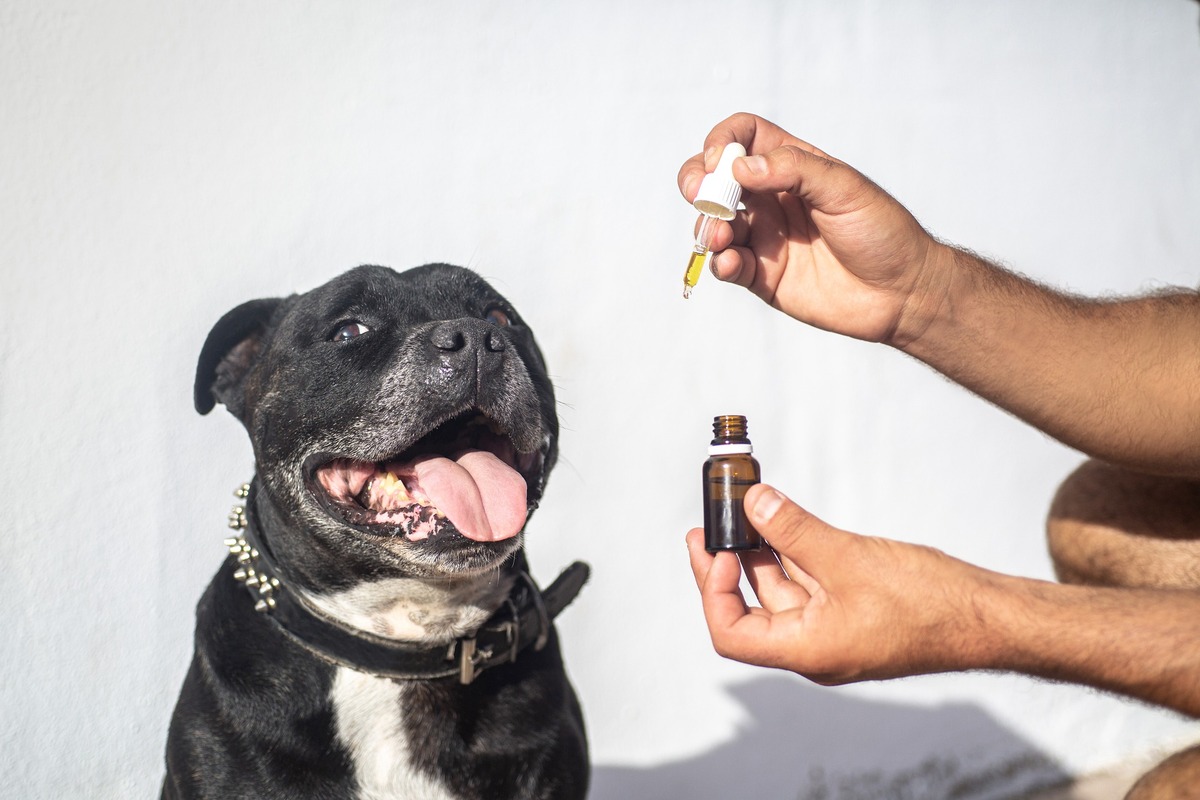Home>Health & Wellness>Common Health Issues>How Is Coconut Oil Beneficial For Dogs’ Allergies


Common Health Issues
How Is Coconut Oil Beneficial For Dogs’ Allergies
Published: January 26, 2024
Discover how coconut oil can help alleviate your dog's allergies and other common health issues. Learn about the benefits of using coconut oil for your pet's well-being.
(Many of the links in this article redirect to a specific reviewed product. Your purchase of these products through affiliate links helps to generate commission for Pawsomeoldies.com, at no extra cost. Learn more)
Table of Contents
Introduction
Dogs are cherished members of countless families, providing unconditional love and companionship. However, just like humans, dogs can experience health issues, including allergies. Canine allergies can manifest in various ways, such as itching, redness, and discomfort, leading to distress for both the pet and its owner. Fortunately, there are natural remedies that can alleviate these symptoms and improve the overall well-being of our furry friends.
One such remedy is coconut oil, a versatile and beneficial product known for its numerous health properties. Derived from the meat of coconuts, this oil has gained popularity for its potential to address a wide range of health concerns in dogs, including allergies. As a pet owner, it's essential to understand the potential benefits of coconut oil and how it can be used to support your dog's health.
In this article, we will delve into the world of canine allergies and explore the ways in which coconut oil can be a valuable ally in addressing these issues. From understanding the nature of dogs' allergies to uncovering the specific benefits of coconut oil for alleviating these symptoms, we will provide comprehensive insights to empower pet owners in caring for their beloved companions.
By the end of this article, you will have a deeper understanding of how coconut oil can be harnessed to support your dog's well-being and provide relief from allergies. Let's embark on this enlightening journey to discover the remarkable potential of coconut oil in enhancing the lives of our canine companions.
Understanding Dogs' Allergies
Dogs, like humans, can suffer from allergies, which occur when their immune systems overreact to certain substances. These allergens can be found in various forms, including pollen, mold, dust mites, and certain foods. When a dog comes into contact with an allergen, it can trigger an immune response, leading to a range of uncomfortable symptoms.
Allergies in dogs can manifest in different ways, with common symptoms including itching, redness, skin irritation, sneezing, watery eyes, and gastrointestinal issues. These symptoms can cause significant discomfort for dogs and impact their overall well-being. Identifying the specific allergen triggering these reactions is crucial in managing a dog's allergies effectively.
It's important to note that dogs can develop allergies at any stage of their lives, and certain breeds may be more prone to allergic reactions. Additionally, environmental factors, such as seasonal changes, can exacerbate allergy symptoms in dogs.
Understanding the nature of a dog's allergies is essential for pet owners to provide the necessary care and support. By recognizing the signs of allergies and identifying potential triggers, pet owners can take proactive measures to alleviate their dog's discomfort and improve their quality of life.
In the next section, we will explore the potential benefits of coconut oil in addressing dogs' allergies, shedding light on its natural properties that can offer relief and support for our canine companions.
Benefits of Coconut Oil for Dogs' Allergies
Coconut oil is renowned for its remarkable properties that can benefit dogs suffering from allergies. This natural remedy offers a range of advantages that can help alleviate allergy symptoms and promote overall well-being in our beloved canine companions.
1. Anti-Inflammatory Properties
Coconut oil contains lauric acid, a fatty acid known for its anti-inflammatory properties. When dogs experience allergic reactions, their skin can become inflamed, leading to itching and discomfort. By applying coconut oil topically or incorporating it into their diet, pet owners can help reduce inflammation and soothe their dog's irritated skin.
2. Skin Moisturization
Allergies can often result in dry, flaky skin for dogs, exacerbating their discomfort. Coconut oil serves as a natural moisturizer, effectively hydrating the skin and forming a protective barrier. Regular application of coconut oil can help alleviate dryness and promote healthier skin, providing relief for dogs experiencing allergy-related skin issues.
3. Antimicrobial Benefits
Coconut oil exhibits antimicrobial properties, thanks to its high concentration of medium-chain fatty acids. When dogs with allergies scratch and irritate their skin, it can lead to secondary infections. By applying coconut oil, pet owners can help combat potential microbial threats and support the skin's natural defense mechanisms, reducing the risk of infections.
4. Immune System Support
The medium-chain fatty acids present in coconut oil can contribute to bolstering a dog's immune system. By incorporating coconut oil into their diet, pet owners can potentially enhance their dog's overall immune function, aiding in the management of allergic responses and promoting a healthier immune system over time.
5. Relief from Itching and Discomfort
One of the most distressing symptoms of allergies in dogs is incessant itching, which can lead to skin damage and further complications. Coconut oil can offer relief by soothing the skin and reducing itching, providing dogs with a much-needed respite from discomfort and allowing them to lead a more contented and relaxed life.
6. Nutritional Benefits
In addition to its topical applications, coconut oil can be a valuable dietary supplement for dogs. When consumed in moderation, coconut oil can provide essential fatty acids and nutrients that support overall health, potentially contributing to the management of allergic reactions from within.
Incorporating coconut oil into a dog's care regimen can offer a holistic approach to managing allergies, addressing symptoms both internally and externally. However, it's important for pet owners to introduce coconut oil gradually and consult with a veterinarian to ensure it aligns with their dog's specific health needs.
By harnessing the natural benefits of coconut oil, pet owners can provide their dogs with a gentle and effective means of managing allergy symptoms, ultimately enhancing their well-being and quality of life.
How to Use Coconut Oil for Dogs' Allergies
When it comes to utilizing coconut oil for addressing dogs' allergies, pet owners have several options to consider. The versatile nature of coconut oil allows for both topical application and dietary supplementation, offering a comprehensive approach to managing allergy symptoms in dogs.
Topical Application
-
Direct Skin Application: Gently massaging coconut oil onto the affected areas of a dog's skin can provide relief from itching and irritation. It's important to ensure that the coconut oil is of high quality and free from additives or fragrances that could potentially exacerbate allergic reactions.
-
Paw Pad Care: Dogs with allergies may experience dryness and cracking in their paw pads. Applying a small amount of coconut oil to their paw pads can help moisturize and protect the skin, offering relief from discomfort.
-
Bathing Solutions: Incorporating coconut oil into a dog's bath routine can help soothe their skin and promote overall skin health. Mixing a small amount of coconut oil into the bathwater or using shampoos containing coconut oil can provide nourishment for the skin and coat.
Dietary Incorporation
-
Gradual Introduction: When introducing coconut oil into a dog's diet, it's essential to start with small amounts and gradually increase the dosage. This allows the dog's digestive system to acclimate to the addition of coconut oil and minimizes the risk of gastrointestinal issues.
-
Mixing with Food: Mixing a small amount of coconut oil with a dog's regular food can provide them with essential fatty acids and nutrients that support skin health and immune function. This method allows for internal nourishment to complement the external benefits of coconut oil.
-
Special Treats: Pet owners can create homemade treats using coconut oil as an ingredient. These treats can serve as a delightful way to incorporate coconut oil into a dog's diet while offering a tasty and beneficial snack.
Considerations
- Quality Matters: It's crucial to select high-quality, organic, and unrefined coconut oil to ensure that dogs receive the full spectrum of benefits without exposure to potentially harmful additives.
- Consultation with a Veterinarian: Before implementing coconut oil into a dog's care regimen, consulting with a veterinarian is advisable. This allows for personalized guidance based on the dog's specific health needs and ensures that coconut oil aligns with their overall well-being.
By leveraging the diverse applications of coconut oil, pet owners can provide their dogs with a multifaceted approach to managing allergies, addressing symptoms both externally and internally. With careful consideration and guidance, coconut oil can become a valuable ally in supporting the health and comfort of dogs experiencing allergic reactions.
Incorporating coconut oil into a dog's care routine can offer a gentle and effective means of managing allergy symptoms, ultimately enhancing their well-being and quality of life.
Precautions and Considerations
When considering the use of coconut oil for managing dogs' allergies, it's essential for pet owners to be mindful of certain precautions and considerations to ensure the well-being of their canine companions.
-
Allergic Reactions: While coconut oil is generally well-tolerated by dogs, there is a possibility of individual sensitivities or allergies. It's crucial for pet owners to monitor their dog's initial response to coconut oil, especially when applied topically or introduced into their diet. If any signs of allergic reactions, such as excessive itching, redness, or gastrointestinal distress, are observed, discontinuing the use of coconut oil is advisable, and consulting a veterinarian is recommended.
-
Dosage and Moderation: As with any dietary supplement, moderation is key when incorporating coconut oil into a dog's diet. Excessive consumption of coconut oil can lead to digestive issues, including diarrhea and stomach upset. Pet owners should carefully adhere to recommended dosage guidelines and gradually introduce coconut oil to allow their dog's system to adjust.
-
Quality Assurance: Selecting high-quality, organic, and unrefined coconut oil is paramount. Avoiding products with additives, preservatives, or artificial flavors ensures that dogs receive the purest form of coconut oil, maximizing its potential benefits while minimizing the risk of adverse reactions.
-
Consultation with a Veterinarian: Prior to integrating coconut oil into a dog's care regimen, seeking guidance from a veterinarian is strongly encouraged. Veterinarians can offer personalized recommendations based on the dog's health history, existing conditions, and specific dietary requirements. This professional insight ensures that the use of coconut oil aligns with the dog's overall well-being and complements their existing healthcare plan.
-
Monitoring and Observation: Pet owners should closely monitor their dog's response to coconut oil, both topically and internally. Observing any changes in behavior, skin condition, or digestive patterns can provide valuable insights into the effectiveness and tolerability of coconut oil for managing allergies in dogs.
By adhering to these precautions and considerations, pet owners can navigate the use of coconut oil for dogs' allergies with attentiveness and care, promoting a safe and supportive approach to enhancing their dog's well-being.
Incorporating coconut oil into a dog's care routine can offer a gentle and effective means of managing allergy symptoms, ultimately enhancing their well-being and quality of life.
Conclusion
In conclusion, the potential benefits of coconut oil for managing dogs' allergies are both compelling and multifaceted. From its anti-inflammatory and antimicrobial properties to its skin-moisturizing and immune-supporting capabilities, coconut oil emerges as a natural ally in alleviating the discomfort and symptoms associated with canine allergies. By harnessing the diverse applications of coconut oil, pet owners can provide their dogs with a holistic approach to managing allergic reactions, addressing symptoms both internally and externally.
The versatility of coconut oil allows for topical application to soothe irritated skin and dietary incorporation to support overall health and immune function. Whether through gentle massages to alleviate itching, paw pad care to moisturize dry skin, or gradual dietary supplementation to enhance nutritional intake, coconut oil offers a gentle and effective means of managing allergy symptoms in dogs.
However, it's crucial for pet owners to approach the use of coconut oil with careful consideration and attentiveness. Monitoring their dog's initial response, adhering to recommended dosage guidelines, and selecting high-quality, organic coconut oil are essential steps in ensuring the well-being and safety of their canine companions. Consulting with a veterinarian to receive personalized guidance based on the dog's specific health needs further enhances the responsible use of coconut oil for managing allergies in dogs.
By integrating coconut oil into a dog's care regimen with mindfulness and care, pet owners can empower themselves to provide their beloved companions with a natural and supportive solution for addressing allergic reactions. The potential of coconut oil extends beyond symptom management, offering a pathway to enhancing the overall well-being and quality of life for dogs experiencing allergies.
As pet owners, our commitment to the health and comfort of our canine companions is unwavering. Through the thoughtful and informed use of natural remedies such as coconut oil, we can embark on a journey of compassionate care, ensuring that our dogs thrive in an environment of comfort, support, and well-being.
In embracing the remarkable potential of coconut oil, we embark on a shared mission to enhance the lives of our beloved canine companions, providing them with the care and relief they deserve. Let us continue to nurture and cherish our dogs, fostering a bond built on compassion, understanding, and the unwavering commitment to their health and happiness.












